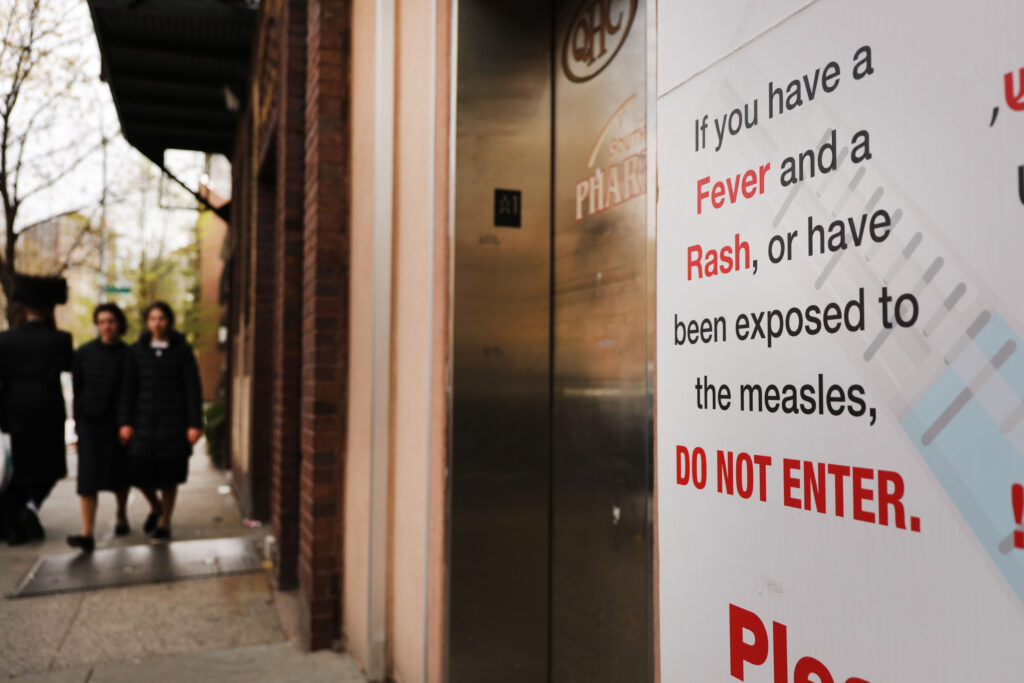New York State Department of Health officials are cautioning residents to be vaccinated when traveling domestically and abroad to avoid contracting the measles amid an uptick in national cases.
Newsweek reached out to the department for comment.
Why It Matters
Measles cases across the United States by March 26 had already eclipsed the total number of viruses contracted from the disease the entire 2024 calendar year, according to New York state health officials.
Of the 483 measles cases reported domestically as of last month, with most of them being discovered in New Mexico and Texas, 442 of them are described as children who had not received the measles, mumps and rubella (MMR) vaccine.
One dose provides 93 percent protection while two doses provide 97 percent protection, according to officials.
What To Know
On April 2, state health officials issued a travel advisory to all New Yorkers potentially traveling to the following 11 high-risk nations:
- Canada
- Yemen
- Pakistan
- India
- Thailand
- Ethiopia
- Romania
- Afghanistan
- Indonesia
- Kyrgyzstan
- Vietnam
The risk to New Yorkers in general is considered “low,” as just four cases—three in New York City and one in Suffolk County—have been identified, with none affiliated to the outbreaks in Texas and New Mexico.
Travel advisories have also been issued to health care providers that include specific MMR vaccine schedules based on the age of the traveler. Babies as young as 6 months can get one dose of the MMR vaccine if traveling abroad.
“Measles is more common in different places and exposure during travel is something we need to consider,” State Health Commissioner Dr. James McDonald said in a statement. “It’s important that New Yorkers ensure they are up-to-date regarding being immunized against measles … in some cases measles is as close as a car ride away.
“Measles can be a serious disease. It is not just a rash; it can cause pneumonia, hospitalization and even death.”
Around 90 percent of individuals near a person with measles will become infected if they are not vaccinated.
U.S. Health and Human Services Secretary Robert F. Kennedy Jr. was in Gaines County, Texas, on Sunday following the death of a second unvaccinated child who succumbed to measles pulmonary failure, according to the Texas Department of State Health Services.
Kennedy, labeled by some as a vaccine skeptic ahead of his current role within the Trump administration, reportedly said he was trying to “control the outbreak” and touted vaccination as “the most effective way to prevent the spread of measles.”
He previously said that the measles vaccine “causes deaths every year” as well as “all the diseases that measles itself causes.”
The outbreak in Canada has reached more than 600 cases, with the majority (570) occurring in Ontario. A total of 227 recorded measles cases had been recorded from the start of the year up to March 6.
The Canadian government is routinely updating measles and rubella data on a revolving online dashboard. The most recent report available online covers from March 16 to March 22, when 119 new measles cases (104 confirmed and 15 probable) were found in three jurisdictions: Alberta, Ontario and Saskatchewan.
A Canadian government spokesperson referred Newsweek to statistics found online.
“In 2024, we saw a sharp increase in measles cases globally compared to 2023,” Dr. Theresa Tam, Canada’s chief public health officer, said in a March 6 statement. “In Canada this concerning trend has continued with more cases reported in the first two months of 2025 than in all of 2024 due to a noticeable increase in cases associated with outbreaks in New Brunswick, Ontario, Québec and Manitoba.”
Tam added: “The majority of cases are unvaccinated or under-vaccinated children who have been exposed in their communities, such as in social events, daycares, schools and healthcare settings.”
What People Are Saying
Kennedy on Sunday: “The most effective way to prevent the spread of measles is the MMR vaccine.”
What Happens Next
New York public health officials advise those who do travel to be wary of signs and symptoms for three weeks upon return, as well as to avoid contact with others who are sick. Symptoms can include:
- High fever (may spike to more than 104 degrees Fahrenheit)
- Cough
- Runny nose (coryza)
- Red, watery eyes (conjunctivitis or pink eye)
- Rash (3-5 days after symptoms begin)
A person with measles can pass it to others as soon as four days before a rash appears, and as late as four days after the rash appears.
Read the full article here
